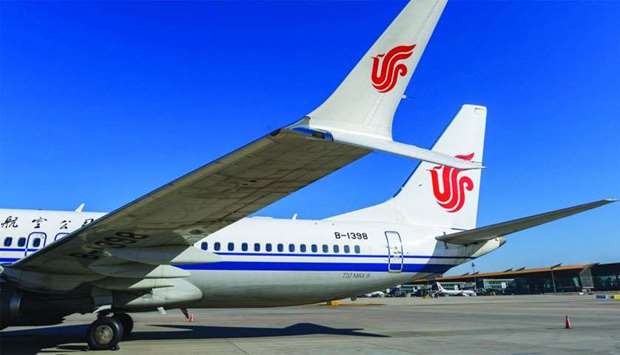The airline industry has been caught in the cross-fire over trade between the United States and China — the two world's largest economies, forcing airlines on both sides to pull out of some key US-China routes.
The escalating trade war between the United States and China seems to have dwindled travel demand between the two countries, which until a few months ago, registered huge passenger and freight volumes.
Air China said recently that it will suspend its flights on the Beijing-Hawaii route from August 27 after a review of its network. China's flagship carrier said travel demand on the route remains weak amid an escalating US-China trade war.
The Air China announcement comes at a sensitive time in the US-China relations as the world's two biggest economies are locked in a trade war that has disrupted global supply chains and rattled financial markets worldwide.
The US tourism industry in particular, has taken a major hit at the height of the peak summer season, dampening a major revenue stream for hotels, restaurants and retailers across the country.
The passenger load factor — an industry metric that measures how much of an airline's passenger carrying capacity is used — for Air China's thrice-weekly Beijing-Honolulu route averaged 66.37% last year, Reuters said, quoting Chinese aviation data provider Variflight.
That was well below the average load factor of 76.7% for Air China's international flights last year.
In 2018, Hawaiian airlines had pulled out of the same non-stop service between Honolulu and Beijing, which it had launched in 2014, citing slower-than-expected growth in demand.
Hawaiian CEO Peter Ingram said the route was suspended due to lack of growth and not because of trade tensions with China.
Beijing in June had issued a travel advisory warning Chinese tourists about the risks of travelling to the United States, citing “concerns about gun violence, robberies and thefts”.
The number of Chinese tourists arriving in the United States posted the first decline in 15 years, last year, US data has shown.
Chinese travel to the US fell by 5.7% last year (to 2.9mn visitors), according to the US National Travel and Tourism Office.
“Travellers from China are seeking alternative destinations amid the trade war with the United States, as travel industry insiders keep a close eye on the decline in the number of those visitors,” The New York Times reported.
China is the third-largest source of overseas travel to the US, producing 3.2mn visitors in 2017 and accounting for 8.2% of all overseas travel to the country, according to the US Travel Association.
Travel is the top US industry export to China, generating a $29.8bn trade surplus with the country in 2017 and accounting for 19% of all exports.
In addition, Chinese tourists spend an average of $6,700 per trip, about 50% more than the average for international visitors.
Obviously, the trend is a real concern for American businesses because Chinese tourists tend to splurge, making up an outsize share of tourism revenue.
China's 3mn visitors last year ranked fifth, well behind Canada's 21.2mn, industry figures reveal. Yet their $36.4bn in outlays ranked at the top, far outpacing Canada's $22.1bn.
The Trump administration has slapped a 25% tariff on $250bn in Chinese imports and is threatening to impose a similar levy on the remaining $300bn in shipments from China.
China has retaliated with duties on $60bn worth of US exports to that country.
Weakening of global trade is likely to continue as the US-China trade war flares. This primarily impacts the cargo business, but passenger traffic could also be impacted as tensions rise, analysts say.
The intensification of the trade war between the United States and China has seen cargo demand drop across the airline industry, with the downward trend expected to continue.
Growth for that segment is forecast to be flat this year, after rising 3.4% in 2018 and 9.7% in 2017, according to the International Air Transport Association.
Goods valued at $6tn are exported by aircraft each year, according to IATA, accounting for 35% of the value of world trade. Air freight companies have already seen revenue fall due to declining shipments of high-tech goods such as semiconductor chips and products used in just-in-time manufacturing.
Freight operators are bracing for more disruption as tensions between Washington and Beijing ratchet up. Trade experts warn that declining shipments — worsened by Brexit jitters and simmering tensions in the Middle East — indicate a slowdown in global growth.
A trade war will adversely impact both air freight and passenger demand and severely hamper an industry that generates billions in revenue, fills government coffers and employs millions globally.
* Pratap John is Business Editor at Gulf Times.


